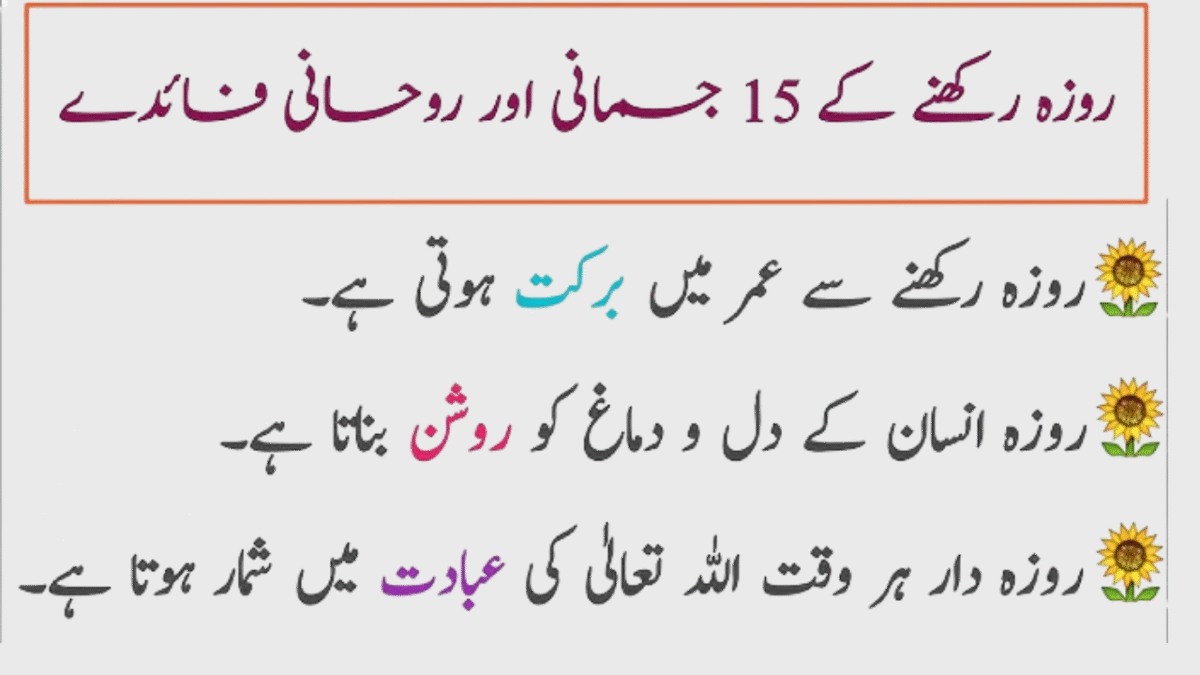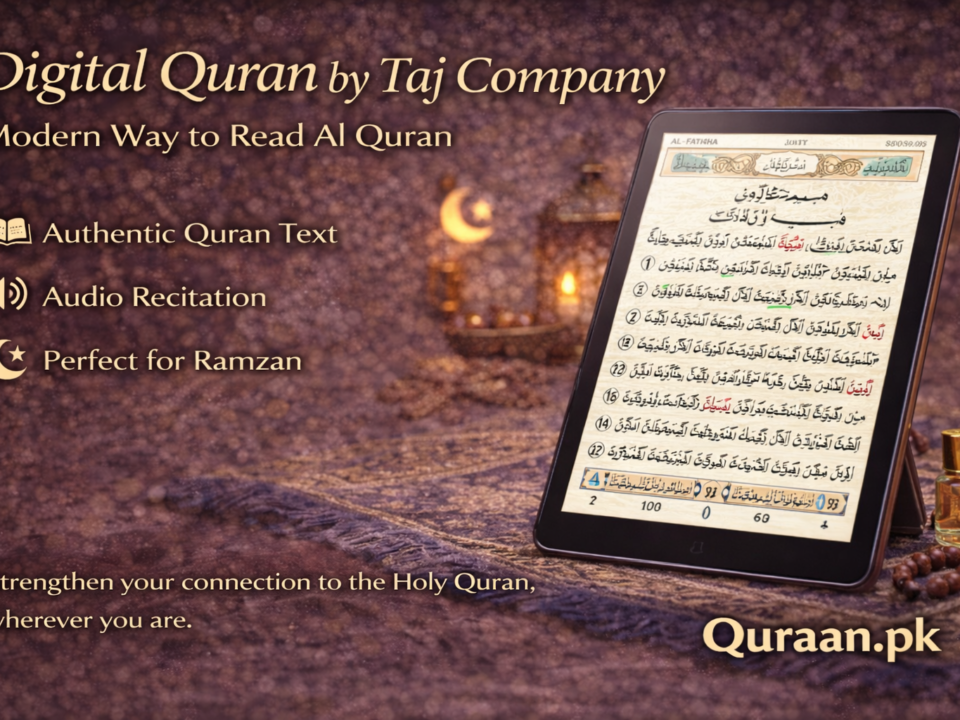Rozay ke Roohani Faide – Dunya aur Aakhirat
Ramadan is the most sacred month in the Islamic calendar, a time when Muslims across the globe unite in fasting, prayer, and worship. Fasting, or roza, is not only about refraining from food and drink but also about nurturing the soul and building a closer relationship with Allah. The beauty of fasting lies in its roohani faide (spiritual benefits), which extend to both this world (dunya) and the hereafter (aakhirat).
The act of fasting purifies the body, disciplines the mind, and elevates the spirit. It is a journey of self-control, compassion, and deep devotion. In this article, brought to you by Taj Company for quraan.pk, we explore the countless spiritual benefits of fasting and how they shape our lives in both the temporal and eternal realms.
The Importance of Fasting in Islam
Fasting is one of the five pillars of Islam, commanded directly by Allah in the Qur’an:
“O you who believe! Fasting is prescribed for you as it was prescribed for those before you, that you may attain Taqwa.” (Surah Al-Baqarah 2:183)
This verse highlights the central goal of fasting: Taqwa—piety and God-consciousness. Prophet Muhammad ﷺ also emphasized fasting as a spiritual shield:
“Fasting is a shield; it will protect you from the Hellfire and prevent you from sins.” (Sunan Ibn Majah)
Building Taqwa through Rozay
- Fasting trains us to restrain desires and control the nafs (ego).
- It protects the tongue from lies, gossip, and harshness.
- It strengthens awareness of Allah, as every moment without food or water is an act of worship.
Rozay ke Roohani Faide in Dunya (Worldly Benefits)
Inner Peace and Patience
Fasting nurtures patience, teaching us to endure hunger, thirst, and challenges. This patience extends beyond Ramadan, helping us manage anger, stress, and daily struggles with tranquility.
Strengthened Self-Discipline
By abstaining from halal food and drink, we learn to resist haram temptations. This discipline improves time management, self-control, and overall productivity in daily life.
Empathy for the Poor and Needy
One of the most beautiful roohani faide of rozay is increased compassion. Feeling hunger allows us to understand the struggles of the poor, inspiring generosity and charity.
Health and Psychological Benefits
While primarily a spiritual act, fasting also improves health:
- Detoxifies the body and improves metabolism.
- Enhances mental clarity and focus.
- Reduces stress and anxiety, as the heart is filled with remembrance of Allah.
Rozay ke Roohani Faide in Aakhirat (Hereafter Benefits)
Rewards of Fasting in Jannah
Allah promises immense rewards for those who fast sincerely. The Prophet ﷺ said:
“Whoever fasts Ramadan with faith and seeking reward, his past sins will be forgiven.” (Sahih al-Bukhari, Sahih Muslim)
The Door of Ar-Rayyan
In Paradise, there is a special gate called Ar-Rayyan through which only those who fast will enter. This is an exclusive honor that shows the elevated status of fasting.
Protection from Hellfire
Fasting acts as a shield from Hellfire. Every moment of hunger and thirst is recorded as worship, protecting the believer in the afterlife.
Multiplication of Rewards
Unlike other acts of worship, fasting is uniquely rewarded by Allah Himself:
“Fasting is for Me, and I will reward it.” (Hadith Qudsi, Sahih al-Bukhari)
This divine promise shows that fasting’s reward is beyond human comprehension.
Qur’an and Hadith on Fasting Benefits
- The Qur’an emphasizes fasting as a path to Taqwa and purification of the soul.
- Prophet Muhammad ﷺ encouraged believers to fast not only from food but also from sins, anger, and negative speech.
- He taught that the smell of a fasting person’s mouth is dearer to Allah than musk.
These teachings highlight that the true roohani faide of fasting lie in its sincerity and devotion.
Practical Ways to Maximize Fasting’s Spiritual Benefits
Balancing Worship and Daily Life
- Organize your day around Salah and Qur’an recitation.
- Use early mornings (suhoor) for Du’a and reflection.
- Dedicate time after Iftar to Taraweeh and Dhikr.
Avoiding Social Media Distractions
- Limit unnecessary screen time.
- Replace scrolling with Qur’an reading or Islamic lectures.
- Use digital platforms only to share beneficial knowledge.
Charity and Community Service During Ramadan
- Give Zakat and Sadaqah generously.
- Volunteer at mosques, community kitchens, or charities.
- Remember that helping others multiplies your fasting rewards.
Why Taj Company and quraan.pk Emphasize This
For centuries, Taj Company has served the Muslim Ummah by publishing authentic Qur’ans and Islamic literature. Through quraan.pk, we aim to provide modern Muslims with spiritual guidance rooted in Qur’an and Sunnah. Discussing Rozay ke roohani faide helps Muslims appreciate fasting not only as a ritual but as a lifelong transformation for both dunya and aakhirat.
Conclusion – Fasting as a Path to Success in Dunya and Aakhirat
Fasting is more than abstaining from food—it is a profound act of devotion that purifies the soul, sharpens discipline, and brings countless blessings. The roohani faide of rozay uplift believers in worldly life by teaching patience, empathy, and discipline, while also securing eternal rewards in the hereafter.
This Ramadan, let us strive to protect our fasts, increase our Qur’an recitation, and engage in acts of charity. By doing so, we can unlock the full benefits of fasting for both dunya and aakhirat.
Read More : Ramzan aur Nafs Ki Islaah – Apni Ghaltiyon Ka Hisaab
FAQs
A: No. Fasting also includes avoiding sinful speech and actions. True fasting is both physical and spiritual.
A: Keep striving. Spiritual transformation often comes gradually through consistent worship, prayer, and sincerity.
A: While fasting in Ramadan is an obligation for Muslims, anyone who fasts sincerely with discipline may experience psychological and physical benefits.




